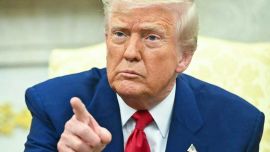Argentina’s talk of ample financing to be provided by the International Monetary Fund on the eve of its presidential election underscores heightened concern over how markets would digest the actual delay in negotiations for a refinancing program.
Economy Minister Sergio Massa told a local TV network Sunday night that the deal under discussion would include a “very big package of disbursements in August and an additional one in November.” Just hours earlier, the IMF said it had reached “understandings” on key goals and parameters for a staff-level agreement with the cash-strapped nation.
It was an unusual statement by the Washington-based lender, published only in Spanish on Twitter and without comments from an IMF official. For Massa, who is also running for president in the October election, it provided an opportunity to appease markets.
“This must have been a favour that Massa asked of the Fund: ‘Please help me so that the markets don’t get so nervous,’” said Claudio Loser, a former director of the Fund’s Western Hemisphere department. “It is a little weaker (than an official statement), but it’s a way to indicate that they’re making progress.”
The IMF didn’t provide comment when asked about its Spanish-language statement, but did welcome currency measures announced by the government on Monday, saying they were “positive to strengthen reserves and consolidate the path of fiscal sustainability.”
Buenos Aires is under pressure to sign a deal with IMF staff because Argentina will fall into arrears with the Fund if it fails to pay back $2.6 billion before July 31. Its foreign reserves are at critical levels as the central bank keeps selling greenbacks to maintain the peso at around 270 per dollar. On the parallel market, one dollar fetches over 500 pesos. A major currency devaluation, widely expected by investors at some point this year or next, could speed up inflation that’s already running at more than 100% a year.
“There was enormous concern about the local market opening this morning without an announcement about anything having to do with the IMF deal,” said Doug Rediker, a former US representative on the IMF’s executive board and a founder of the political-consultancy firm International Capital Strategies. After all, he added, “Massa had said there would be a deal announced last Friday.”
The strategy seems to have worked, at least for now.
Argentina’s overseas bonds climbed to their highest in almost six months on Monday, although some investors were surprised by the lack of additional information from the Fund. Bonds due 2030 climbed as much as 0.7 cent to nearly 35 cents on the dollar, their highest since early February.
Argentina needs to refinance its record $44 billion program with the IMF after President Alberto Fernandez’s government failed to meet its requirements amid a record drought that cost the country $20 billion of agricultural exports, according to economy ministry estimates.
As part of the pending agreement, Argentina on Monday rolled out another temporary exchange rate for agriculture exports while raising import tariffs on goods and services in a bid to preserve central bank reserves. Economist Marcos Buscaglia, co-founder of the consulting firm Alberdi Partners, said the measures were likely conditions before an agreement could be finalised.
“My interpretation is that the fund doesn’t trust Massa and is asking for prior action,” Buscaglia said.
Miguel Kiguel, a former undersecretary of finance in Argentina, said the tariffs and additional exchange rate might improve the fiscal accounts, but the chances it digs reserves out of the red are low.
“This is a program to try to stop the drainage but it won’t help to build up reserves or to get us out of this trap,” said Kiguel, who’s now head of Buenos Aires-based consulting firm EconViews.
The fiscal, monetary and reserves goals of the reworked agreement remain up in the air — as does the form of payment for the approaching July payment. While repaying the IMF in yuan again in July remains an option, it’s not the government’s first choice, according to a senior government official who asked not to be named discussing ongoing talks.
Political Spotlight
Talks between Argentina and the IMF have dragged on for months as Massa, Argentina’s chief negotiator, emerged as the ruling coalition’s top presidential candidate, pushing the deal further into the political spotlight.
“It’s clear politically that the objective is to prevent the currency from falling before the elections, and this could be very expensive,” said Martin Muhleisen, a former director at the IMF’s strategy, policy and review department. “It’s good that they’re apparently in tough negotiations to come to some sort of agreement that allows the funding to continue while holding the government responsible for solid policies within the circumstances.”
The IMF executive board usually takes two weeks from the time of the staff-level agreement to vote on a deal, meaning it’s unclear if any disbursement will be available before July 31. One senior Argentine official said government teams and IMF staff are working on a technical solution to get around the customary two-week period, declining to provide more specifics.
In any case, the deal being current negotiated seems to be largely focused on keeping Argentina afloat until a new president takes office in December. It will be the new leader’s chief task to find the type of national consensus needed to make fundamental reforms to put the economy back on its feet, Muhleisen said.
“To the extent that they can lay the groundwork for a solid program after the elections, ideally supported by both major parties, that would be a good thing,” he said. “But I’m not optimistic that this is going to happen.”
By Manuela Tobias and Eric Martin/Bloomberg



















Comments